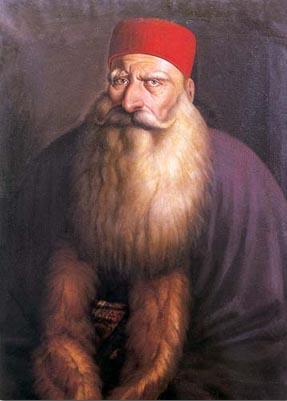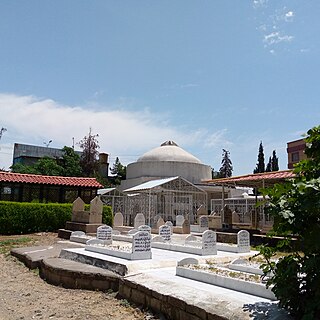
Fakhr al-Din Ma'n, commonly known as Fakhr al-Din II or Fakhreddine II, was the paramount Druze emir of Mount Lebanon from the Ma'n dynasty, an Ottoman governor of Sidon-Beirut and Safed, and the strongman over much of the Levant from the 1620s to 1633. For uniting modern Lebanon's constituent parts and communities, especially the Druze and the Maronites, under a single authority for the first time in history, he is generally regarded as the country's founder. Although he ruled in the name of the Ottomans, he acted with considerable autonomy and developed close ties with European powers in defiance of the Ottoman imperial government.
Ahmad ibn Hanbal was a Muslim scholar, jurist, theologian, traditionist, ascetic and eponym of the Hanbali school of Islamic jurisprudence—one of the four major orthodox legal schools of Sunni Islam. The most highly influential and active scholar during his lifetime, Ibn Hanbal went on to become "one of the most venerated" intellectual figures in Islamic history, who has had a "profound influence affecting almost every area" of the traditionalist perspective within Sunni Islam. One of the foremost classical proponents of relying on scriptural sources as the basis for Sunni Islamic law and way of life, Ibn Hanbal compiled one of the most significant Sunni hadith collections, al-Musnad, which has continued to exercise considerable influence on the field of hadith studies up to the present time.

Mullah Shah Badakhshi, popularly known as Mullah Shah was a 17th-century Muslim Sufi, and spiritual successor of the famous Sufi saint Mian Mir. He was born to a Qazi in the village of Araska in the Rustaq area of Badakhshan from which also his name is derived from. He belonged to the Qadiri order of Sufism. He was the spiritual mentor of the Mughal prince Dara Shikoh Qadri and his sister Princess Jahanara Begum. Dara Shikoh desired to be initiated into the Qadri order at the hands of Mian Mir. After Mian Mir's death, Dara Shikoh's search for a murshid took him to Kashmir where he met Mulla Shah Badakhsi. In Sakinatul Awliya Dara Shikoh writes in the chapter titled "Mulla Shah Badakhsi":
Abu Ya'qub Ishaq ibn Ahmad al-Sijistani or al-Sijzi (السجزي), also known as Bandaneh, was a 10th-century Persian Ismaili missionary active in the northern and eastern Iranian lands. His life is obscure, but he was a prolific writer, who played a crucial role in the infusion of Neoplatonic ideas into Isma'ili theology.

Bashir Shihab II was a Lebanese emir who ruled the Emirate of Mount Lebanon in the first half of the 19th century. Born to a branch of the Shihab family which had converted from Sunni Islam, the religion of previous Shihabi emirs, he was the only Maronite ruler of the Mount Lebanon Emirate.
Wageh El Amar is a 2001 Egyptian soap opera mini-series. It was broadcast in the month of Ramadan on 23 Arabic TV channels. The series was hyped by the media, mainly because it marked the return of Egyptian actress Faten Hamama. An episode was aired every day for 35 days. It was directed by Adel El Aassar and was written by Magda Khayrallah. The series won the Best Series award in the Egyptian Radio and Television Festival in 2001.
Ghassan Hamdan is an Iraqi scholar, poet and translator.
Ghadah Al-Samman is a Syrian writer, journalist and novelist born in Damascus in 1942 to a prominent and conservative Damascene family. Her father was Ahmed Al-Samman, a president of the University of Damascus. She is distantly related to poet Nizar Qabbani, and was deeply influenced by him after her mother died at a very young age.
Bab Al-Hara is one of the most popular television series in the Arab world, reportedly watched by millions of people in the Arab world. The series chronicles the daily happenings and family dramas in a neighborhood in Damascus, Syria in the inter-war period under French rule when the local population yearned for independence. The appeal is cross-generational, and viewers include Muslims, Christians, Druze and Jews from Arab countries. The show was a huge success in the Arab World, so MBC managed to renew it for a second season. The series' second season was even a bigger success, and the finale was watched by over 50 million viewers around the Arab World. It was renewed for 10 more seasons.

Mulla Abu Bakr Effendi, also Mulla Effendi, also Abu Bakr IV or Küçük Mulla was a senior Islamic philosopher, scholar, astronomer, politician, and a prominent personality from Arbil, Iraq.

Ahmed Uthman Effendi also known as Ahmed Effendi, was a Kurdish politician from Erbil who played an important role in shaping events and the direction of public administration in Iraqi Kurdistan in the first half of the twentieth century.

The Battle of Anjar was fought on 1 November 1623 between the army of Fakhr al-Din II and an coalition army led by the governor of Damascus Mustafa Pasha.

The Ma'n dynasty, also known as the Ma'nids;, were a family of Druze chiefs of Arab stock based in the rugged Chouf area of southern Mount Lebanon who were politically prominent in the 15th–17th centuries. Traditional Lebanese histories date the family's arrival in the Chouf to the 12th century, when they were held to have struggled against the Crusader lords of Beirut and of Sidon alongside their Druze allies, the Tanukh Buhturids. They may have been part of a wider movement by the Muslim rulers of Damascus to settle militarized Arab tribesmen in Mount Lebanon as a buffer against the Crusader strongholds along the Levantine coast. Fakhr al-Din I, the first member of the family whose historicity is certain, was the "emir of the Chouf", according to contemporary sources and, despite the non-use of mosques by the Druze, founded the Fakhreddine Mosque in the family's stronghold of Deir al-Qamar.

Syrian literature is modern fiction written or orally performed in Arabic by writers from Syria since the independence of the Syrian Arab Republic in 1946. It is part of the historically and geographically wider Arabic literature. Literary works by Syrian authors in the historical region of Syria since the Umayyad era are considered general Arabic literature. In its historical development since the beginnings of compilations of the Quran in the 7th century and later written records, the Arabic language has been considered a geographically comprehensive, standardized written language due to the religious or literary works written in classical Arabic. This sometimes differs considerably from the individual regionally spoken variants, such as Syrian, Egyptian or Moroccan spoken forms of Arabic.

The Kurdistan Democratic Party, usually abbreviated as KDP or PDK, is the ruling party in Iraqi Kurdistan and the senior partner in the Kurdistan Regional Government. It was founded in 1946 in Mahabad in Iranian Kurdistan. The party states that it combines "democratic values and social justice to form a system whereby everyone in Kurdistan can live on an equal basis with great emphasis given to rights of individuals and freedom of expression."

Mírzá Muḥammad Muṣṭafá al-Baghdádí (1837/8—1910) was a prominent Iraqi adherent of the Baháʼí faith and one of 19 Apostles of Baháʼu'lláh. Mustafá was among the leading Baháʼís in Iraq until he moved to Beirut in the late 1870s, where he coordinated pilgrims going to see Baháʼu'lláh in ʻAkká, and later he was involved with the movement of the Báb's remains to ʻAkká.

Muhammad Abul Huda al-Yaqoubi is a Syrian religious leader and Islamic scholar. He has opposed Syrian president Bashar al-Assad and Islamic State leader Abu Bakr al-Baghdadi.

Mustafa Wahbi Tal, also known by his pen name Arar, was a Jordanian poet, writer, teacher and civil servant, widely regarded as Jordan's most prominent poet and among the best-known Jordanian poets among Arab readers.
Yusuf Sayfa Pasha was a chieftain and multazim in the Tripoli region who frequently served as the Ottoman beylerbey of Tripoli Eyalet between 1579 and his death.

Beirut Nightmares (1976) is a novel written by Syrian author Ghada al-Samman. It was translated to several languages, including Russian (1987) and Polish (1984). The novel covers cultural, societal, political, religious, and psychological aspects, in addition to fantasy and magical realism through hallucinations, involving symbolism as a way to explain these aspects. Pauline Vinson explains that Samman's usage of symbolism is not only tied up to socio-political and historical conditions but is also let into the world of fantasy and the surreal, a style close to magic realism.













